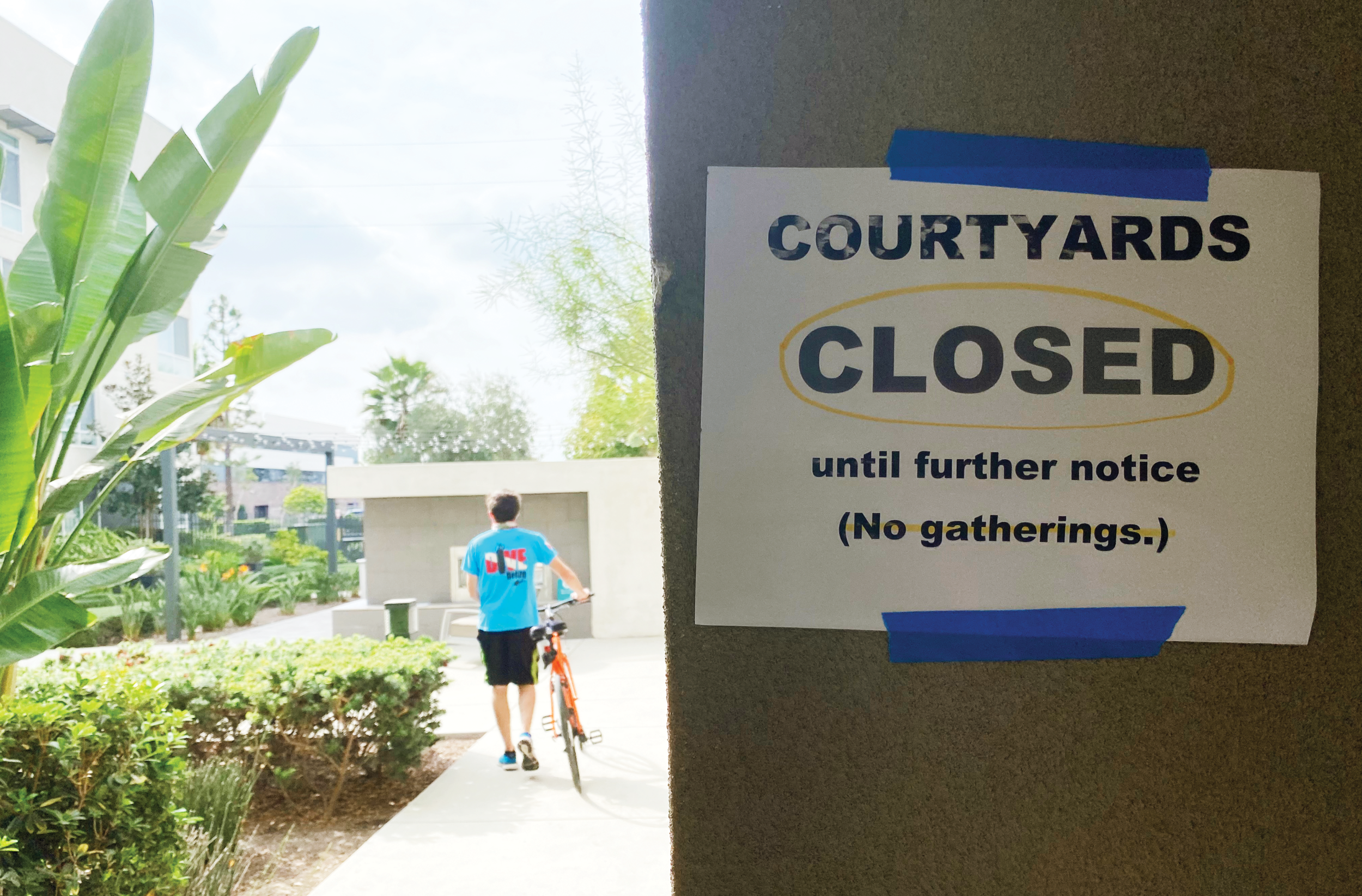COVID-19 outbreaks in residence halls follow campus reopening
Due to an increased number of COVID-19 cases at the Chapman Grand Apartments, Residence Life closed all courtyards and common spaces to limit gatherings and reduce the spread of the coronavirus. JASMIN SANI, Editor-in-Chief
The number of COVID-19 cases within Chapman University housing has steadily increased since approximately 900 students moved into the Chapman Grand Apartments, The K Residence Hall, the Panther Village Apartments and the Davis Apartments in preparations for a hybrid fall semester. With 28 confirmed active COVID-19 cases as of Oct. 23, Joseph Koluder, the assistant director of Residence Life and First Year Experience, told The Panther Chapman offered 252 additional testing appointments for Chapman student residents at the Student Health Center testing site on West Sycamore Avenue from Oct. 19 to Oct. 21.
Residence Life and First Year Experience also led a second round of required testing for all of The K residents after confirming at least 16 total cases within the building. President Daniele Struppa announced in an Oct. 23 email that two additional student residents tested positive for COVID-19, bringing the number of active student housing cases to 17.
Grace Strobel, a freshman business administration major living at Chapman Grand, tested positive for COVID-19 Oct. 17. While Strobel admits she could have been more cautious while social distancing, her test result still came as a surprise because she hadn’t shown any symptoms.
“Personally, I think that there have been more than 36 COVID-19 cases (on campus),” Strobel said. “Whether that’s from them not reporting (their case) to Chapman or from students getting (the virus), not getting tested and never realizing that they had it, I think there have been more.”
Ratish Ragavendiran, a freshman biochemistry and molecular biology major who also lives at Chapman Grand, temporarily moved into a new apartment Oct. 17 after his roommate tested positive for COVID-19 the day before.
“At first it felt like more of an inconvenience (to move out) because of the added stress and time it took, but after everything is done, it’s helpful to have my own place where I don’t have to worry about COVID-19,” Ragavendiran said. “I feel safer having my own space.”
Yet as cases rise and campus continues opening to more students, Struppa remains undeterred in proceeding with the current plan to return to campus. He announced Oct. 23 that Chapman will begin to implement mandatory monthly testing for all faculty, staff and students who regularly access campus facilities on Nov. 2.
“While we currently do not believe we will need to roll back our gradual increase in the campus population, we are sensitive to the fact that there are factors that could cause changes,” Struppa wrote in a community-wide email Oct. 19.
Struppa emphasized in an Oct. 14 interview with The Panther that if students follow social distancing protocols, wear masks and sanitize their hands regularly, then he “can’t imagine people getting sick” after attending on-campus classes.
“There are people who are going to get sick, but they’re not going to get sick because we are reopening the school,” Struppa said. “They are going to get sick because of what they do after hours.”
The first confirmed outbreak among Chapman students occurred in The K Residence Hall. Marynell Dethero, a junior film studies major who lives at The K, was taken off guard when Struppa announced the outbreak and required testing for The K residents Oct. 12.
“It’s very quiet here, and you don’t see many people,” Dethero said. “It was definitely surprising when I heard there was a COVID-19 outbreak, especially because I know most of the kids here are freshmen.”
In normal circumstances, resident advisers (RAs) are responsible for facilitating a smooth transition into the college housing experience and overseeing the well-being of their student residents. Christine Choi, an RA at Chapman Grand and junior English major, described how these tasks may now be burdened with added difficulty of ensuring student resident safety.
“It definitely has been a little bit nerve-wracking, because sometimes I see residents in the hallways not wearing their masks,” Choi said. “I don’t know what the situation of every student is, and always coming into contact with students who don't wear their masks in the residence halls makes me nervous.”
Struppa will host a town hall discussion Oct. 28 to discuss updates regarding Chapman’s COVID-19 response and testing process. Various individuals, including Student Health Director Jaqueline Deats, Director of Residence Life and First Year Experience Dave Sundby and Vice President and Chief Information Officer Helen Norris will accompany Struppa, among others.
Students and faculty returning to campus after Thanksgiving break will be required to take COVID-19 tests before accessing classrooms.

